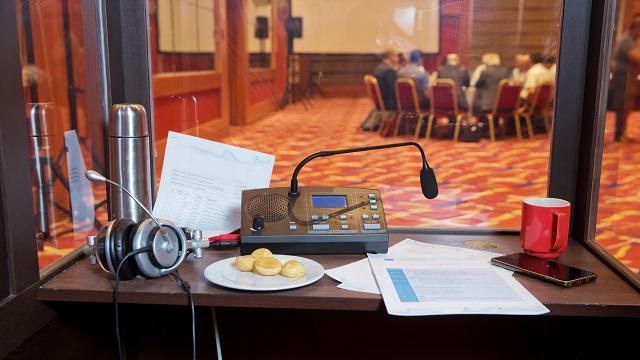-
QUALIFICATIONS
- For Linguists Worldwide
- For UK Public Services
- Preparation
- Policies & Regulation
-
MEMBERSHIP
- Join CIOL
- Membership grades
- NEW for Language Lovers
- Chartered Linguist
- Already a member?
- Professional conduct
- Business & Corporate Partners
-
ASSESSMENTS
- For Second Language Speakers
- English as a Second Language
-
EVENTS & TRAINING
- CPD, Webinars & Training
- CIOL Conference Season 2025
- Events & Networks
- CIOL Mentoring
-
NEWS & VOICES
- News & Voices
- CIOL eNews
- CIOL Awards
- The Linguist
- Jobs & Ads
-
RESOURCES
- For Translators & Interpreters
- For Universities & Students
- Standards & Norms
- CIOL & AI
- All Party Parliamentary Group
- In the UK
- UK Public Services
- Find-a-Linguist
Being qualified as an interpreter
By James Mallinson MCIL, winner of the 2019 Best Overall DPSI Candidate and Best DPSI Candidate in English Law.
 I am a native speaker of English and work with French and Italian. It was only after I had been working as a freelance interpreter for a number of years that I became aware of the standing of the Diploma in Public Service Interpreting (DPSI) qualification from CIOL and of the high regard in which it is held by professionals who work with interpreters and by language practitioners in the field. The DPSI, which is awarded by CIOL Qualifications, has built up its reputation over thirty years and is considered by linguists and professionals alike to be the gold standard of interpreting awards.
I am a native speaker of English and work with French and Italian. It was only after I had been working as a freelance interpreter for a number of years that I became aware of the standing of the Diploma in Public Service Interpreting (DPSI) qualification from CIOL and of the high regard in which it is held by professionals who work with interpreters and by language practitioners in the field. The DPSI, which is awarded by CIOL Qualifications, has built up its reputation over thirty years and is considered by linguists and professionals alike to be the gold standard of interpreting awards.
In view of the high standing of the CIOL Qualifications DPSI, I set myself the objective of achieving the award for my own personal satisfaction and also for the professional recognition it affords and as a mark of linguistic competence in which other professionals could have confidence. I opted for the English Law pathway and was awarded the DPSI in Italian in 2015, in recognition of which I was admitted to the top tier of the interpreting agencies with which I am registered and offered a broader range and higher level of work and with some agencies a higher rate of pay. Having built up some considerable experience in interpreting in Italian, as holder of the CIOL DPSI I was able to apply to be admitted to the National Register of Public Service Interpreters (NRPSI), through which I have been contacted directly by professionals with offers of interpreting appointments.
I decided to sit the DPSI examinations in French as a challenge from a French friend but also, and more particularly, with a view to gaining the professional recognition afforded only by CIOL’s DPSI qualification, which I attained in 2019.
In addition to working as an interpreter I have also been involved since 2015 in supporting candidates preparing for DPSI exams. Besides encouraging them to use all of the examination preparation resources on the CIOL website, develop their knowledge of the subject matter and their command of English and the Other Language through reading, radio, television, research on the internet and building glossaries, I urge them on the days of the exams to relax and have confidence in their ability.
When I was studying for my DPSI in Italian I was advised to “expect the unexpected” and to “keep it simple”. When I was supporting candidates last year, we adopted as our ‘joke’ mantras for no omissions, no additions, appropriacy of register and tone, etc, in delivering best practice “say it as it is” and “do what it says on the tin”.
More
The Chartered Institute of Linguists (CIOL), Incorporated by Royal Charter, Registered in England and Wales Number RC 000808 and the IoL Educational Trust (IoLET), trading as CIOL Qualifications, Company limited by Guarantee, Registered in England and Wales Number 04297497 and Registered Charity Number 1090263. CIOL is a not-for-profit organisation.








